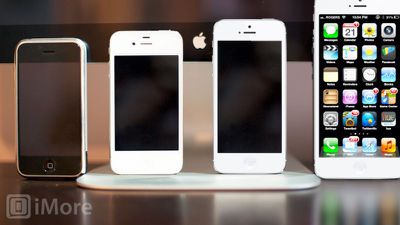iMore Editor-in-Chief Rene Ritchie has written a worthwhile opinion piece arguing that part of Apple's challenge in maintaining its performance in an increasingly competitive smartphone market is the predictability of its "tick-tock" strategy of a major iPhone release every other year and an 'S' refresh on the years in between.

Ritchie, whose close sources within Apple led him to report the Lightning connector several months before it was released and correctly predict both the iPad mini launch date and the announcement date of the iPhone 5, says this predictability hurts sales and helps competitors.
[Consumers] began to realize when new iPhones would be released. That led to a slowdown in sales for existing iPhone models just prior to the presumed next release. Apple taught people when to buy, and by extension, when not to buy.
Apple also taught competitors how to counter-program the iPhone. It's probably not a coincidence that HTC announced their next-generation Android phone, the HTC one, back in February, or that Samsung is holding their Galaxy S4 event this March.
Apple's approach of maintaining the same external casing and largely unchanged internal components in its 'S' models limits the innovation that can be offered, making consumers far more likely to look around at competitor products in 'S' years, giving competitors a great opportunity to launch major new models.
Ritchie points to the range of rumors circulating around potential new products from Apple, and says that while all are unlikely to be true, "breaking patterns and challenging expectations is just one way to solve that problem".




















Top Rated Comments
Now it seems they've fallen right back into the trap. People expect a new iPad in the spring, a new iPhone in June, new iPods in September, etc.
On the other hand, when they don't stick to a regular schedule you get people complaining that "I didn't expect the new iPad until spring! WTF now my iPad x is totally obsolete 3 months early!"
Seems they can't win no matter what.
The one big aspect of the Galaxy line that drives the average consumer to make a purchase is it's screen size. Apple may or may not address that with a larger iPhone in the future.
I like the "if it ain't broke, don't fix it" approach, if you have a great product that works perfectly and does everything that it should (but not all kinds of unnecessary things that may look cool but don't actually do much), then there's not much to innovate. There isn't regularly a need for new ideas, unless you're a bored rich kid.
The expectation of being constantly flooded by new features doesn't come from the need for new features. It comes from boredom and people not knowing what to do with themselves and their money.
Phones are now like computers, and need to keep getting faster to stay where they are, hence the "S" releases. It's necessary because software gets more demanding without boundaries. That leaves 2 years to come up with useful ideas which may then become things that actually make life better.
I'd rather Apple stay focused on making great products than trying to rival others who drown people in new features that most people won't ever use, yet it's the number one cause of them buying the thing in the first place. Just because people are stupid doesn't mean your product should be stupid too.
The world is accelerating and lately you can't buy anything that won't be obsolete and slow in 2-3 years. It's more pronounced with phones than anything, and I don't think making them obsolete even faster is a good idea.
Increase in sales (and market share) does not equal "consumers far more likely to look around at competitor products."